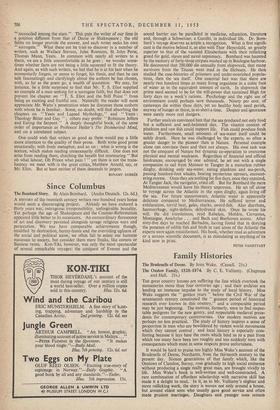Since Columbus
The Bombard Story. By Alain Bombard. (Andre Deutsch. 12s. 6d.) A HISTORY of the twentieth century written two hundred years hence would seem a discouraging project. Already we have endured a thirty years war, outrageous irresponsibility, unforgivable brutality. Yet perhaps the age of Shakespeare and the Counter-Reformation appeared little better to its successors. An extraordinary florescence of art and discovery persisted alongside savage religious wars and persecution. We too have comparable achievements though, muddled by destruction, heresy-hunts and the overriding ugliness of the social and political scene, we often fail to relate our humane successes to society, but consider them mere freaks, like comets or Siamese twins. Kon-Tiki, however, was only the most spectacular of several remarkable voyages: the conquest of Everest and the sound barrier can be paralleled in medicine, education, literature and, through a Schweitzer, a Gandhi, in individual life. Dr. Bom- bard's voyage deserves as ample a recognition. What is first signifi- cant is the motive behind it, as also with Thor Heyerdahl, so greatly superior to that of the vaunted Elizabethans with their rollicking greed for gold, slaves and naval supremacy. Bombard was haunted by the memory of forty-three corpses washed up in Boulogne harbour. He discovered that 200,000 die annually from shipwreck, that many survivors from the Titanic went mad in the lifeboats. He then studied the case-histories of prisoners and under-nourished popula- tions, then the sea itself. One essential fact was that there are nearly two hundred times as.many living organisms in a cubic foot of water as in the equivalent amount of earth. In shipwreck the prime need seemed to be for the will-power that sustained Bligh for forty days on a week's rations. Psychology and the right use of environment could perhaps save thousands. Ninety per cent. of castaways die within three days, yet no healthy body need perish, anyway of hunger or thirst, in so short a time. Despair and ignorance were surely more real dangers.
Further analysis convinced him that the sea produced not only food but a sufficient and well-balanced diet. The vitamin content of plankton and raw fish could support life. Fish could produce fresh water. Furthermore, small amounts of sea-water itself could be safely drunk. Here he was challenged by the experts, so often a greater danger to the pioneer than is Nature. Personal example alone can convince them and then not always. His own task was not the conquest of Nature but dynamic co-operation to overcome physical and mental weakness. Regardless of financial and official hindrances, encouraged by one admiral, he set out with a single companion to sail from Monaco to Tangier in a motorless rubber dinghy, drinking only sea-water, eating plankton and sea-perch, passing hundred-foot whales, hearing mysterious uproars, encount- ering storms. Once they ate nothing for five days, once they capsized. At Tangier Jack, the navigator, cried off. But for Bombard the mere Mediterranean would leave his theory unproven. He set off alone to voyage across the Atlantic in the open dinghy, again living off the sea. For future connoisseurs, Atlantic water is apparently delicious compared to Mediterranean. He suffered terror and exhilaration, torrid heat, gales, sharks, sword-fish. Also diarrhoea, haemorrhage, sight-defects, dehydrated skin. Once he wrote his will. He did translations, read Rabelais, Moliere, Cervantes, Montaigne, Aeschylus . . . and Bach and Beethoven scores. After sixty-five days he reached Barbados, having found that in denying the presence of edible fish and birds in vast areas of the Atlantic the experts were again misinformed. His book, whether read as adventure or a serious scientific document, is as stimulating as anything of its kind now in print.
PETER VANSITTART


































 Previous page
Previous page